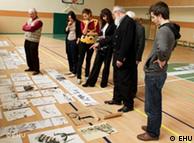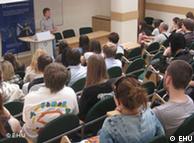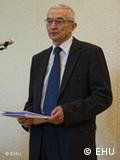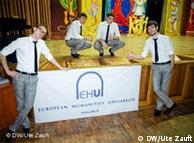
| Location: | Eastern Europe, east of Poland |
A free-thinking Belarusian university can only operate outside of Belarus
"The EHU is a university in exile," Maxim, a student proudly told a group of high school graduates from Belarus during a tour of the European Humanities University (EHU) facilities on open house day.
The EHU is located in a building on the outskirts of the Lithuanian capital, Vilnius, where it moved by invitation of the Lithuanian government after being forcibly and abruptly closed down by the Belarusian authorities in Minsk six years ago.
The European Commission, several EU nations and the United States also provide support to the exile university.
 Bildunterschrift: Großansicht des Bildes mit der Bildunterschrift: Popular: the Comedy Club at the EHU
Bildunterschrift: Großansicht des Bildes mit der Bildunterschrift: Popular: the Comedy Club at the EHU
Maxim told the visiting students how important extra-curricular activities were at his university. It has its own newspaper, several sports clubs and a team of election observers scheduled to travel to Bosnia-Herzegovina for this year's parliamentary polls - the students organize everything themselves.
"Any questions?"
"Please ask questions - that's important!" Maxim told the tour group.
But in general, he knows from experience that Belarus high school graduates are not used to asking questions yet, at least not questions that might not be officially desirable.
 Bildunterschrift: Großansicht des Bildes mit der Bildunterschrift: Art students at a lecture
Bildunterschrift: Großansicht des Bildes mit der Bildunterschrift: Art students at a lecture
Vilnius is just a two-hour train ride from Minsk, the capital of Belarus, the two countries share a border, but they are nevertheless worlds apart. Lithuania joined the European Union in 2004, while neighboring Belarus has been ruled by its authoritarian president, Alexander Lukashenko, for the past 16 years.
Two Belarusian professors founded the European Humanities University in Minsk in 1992, shortly after the collapse of the Soviet Union.
"We wanted to end decades of separation from the rest of Europe, and finally establish studies free of ideology," said Anatoli Mikhailov, the university's principal. The newly founded university quickly formed international ties; within Belarus, it soon became known for its disputatious students.
Too independent
Protests following Alexander Lukashenko's first re-election in 2001 showed that almost the entire EHU's student body opposed the president. The university came under increasing pressure and in 2004 the country's education ministry withdrew the EHU's teaching permit.
 Bildunterschrift: Großansicht des Bildes mit der Bildunterschrift: Mikhailov: we wanted a university free of ideology
Bildunterschrift: Großansicht des Bildes mit der Bildunterschrift: Mikhailov: we wanted a university free of ideology
Formal reasons were cited, but Mikhailov said the move was clearly political.
"Lukashenko always personally appointed the state universities' heads," he said. "Everything was under state control - except for us. We were like an island."
The authorities, Mikhailov said, must have regarded the university as a threat to all of the country's students.
Lithuanian asylum
Formally, EHU is a Lithuanian university, but 97 percent of its roughly 2,000 students come from Belarus. They commute back and forth or get a degree via correspondence courses.
Tatsiana Chulitskaya, who teaches politics at the EHU, said some students chose the university for pragmatic reasons, since it is the only Belarusian university to offer a European degree.
She said the B.A. was not recognized in Belarus, but it allowed students to continue their studies in Europe and in the US.
 Bildunterschrift: Großansicht des Bildes mit der Bildunterschrift: Open house at the EHU
Bildunterschrift: Großansicht des Bildes mit der Bildunterschrift: Open house at the EHU
Katerina, 20, studies art at the EHU. She was not very interested in politics, and was shocked that the professors routinely encouraged the students to ask questions.
"That was something we were not used to," she said.
But now, she added, she was learning how to gather information and to form her own opinion based on that information. That created a certain distance from her friends in Belarus, she said.
"They don't see any alternatives, they've all got the same black-and-white point of view, and they are content as long as there's no war," she said
Next, Katerina wants to get a master's degree, either at the EHU or another European university. In the long run she does want to return to Belarus - taking with her a newly acquired ability to challenge and question the status quo.
Author: Ute Zauft (db)
Editor: Michael Lawton

沒有留言:
張貼留言